From time to time, humanity’s powers of kidding itself have produced short-lived crops of deluded optimists. Half a century ago, for example, young people not yet reconciled to grim reality pushed back at society’s constraints… Free love! Communes! Bold hairstyle choices suitable for those who have not yet experienced male pattern baldness!
Unsurprisingly, hippiedom and the counterculture leaked into science fiction, with various degrees of optimism. Here are five examples.
The Butterfly Kid by Chester Anderson (1967)
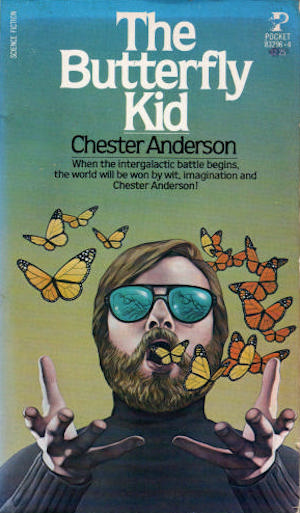
This book is set in an imagined futuristic New York, which oddly enough has remained stuck in an eternal 1960s. There’s still a vibrant hippie community in Greenwich Village. Youngsters from across square America travel to New York to discover themselves; there they are mentored (or at least observed) by old hands like Chester Anderson and his close friend Michael Kurland. This Greenwich Village is populated by nonconformists as eccentric as they are kind-hearted—for the most part.
The most notable exception is shameless grifter Laszlo Scott. For once, Scott’s most recent pharmaceutical offering is entirely authentic: his “Reality Pills” can make dreams real. The aliens supplying Scott have a malign intent: they may not want to actively unleash the heat rays, but they are counting on human nightmares to exterminate us all, leaving the world ripe for alien appropriation. Standing between humanity and certain doom: sixteen Greenwich Village potheads and hipsters. Two of whom are missing….
* * *
Gameplayers of Zan by M. A. Foster (1977)
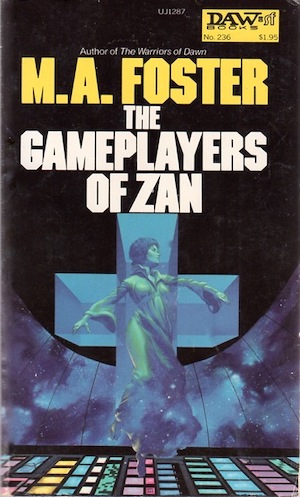
Earth in 2550 is a crowded, highly urbanized world uncongenial to nonconformists. Nevertheless, one small enclave enjoys a rustic life outside the regimented conformity of Shifter Society. The Ler manage this because while derived from humans, they are not human and cannot be integrated into the current human culture. Creations of 21st century hubris, the Ler were grudgingly allotted a small reservation, which they have repaid with ongoing assistance in contriving ways to keep the overcrowded Earth functioning.
The convenient arrangement is unstable; some small event could easily trigger crisis. This comes in the form of a young Ler woman named Maellenkleth, who is caught committing a seemingly pointless act of vandalism. Rather than explain herself, Maellenkleth erases her own mind, thus ensuring that the authorities will be very interested in what was so important a young Ler would commit a form of suicide to conceal it. Questions follow—questions the Ler very much need not to be asked.
* * *
Songs from the Stars by Norman Spinrad (1980)
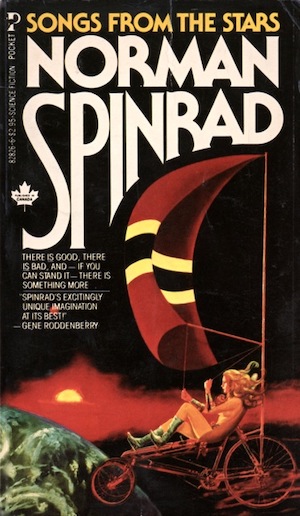
The Smash was a total stone-cold bummer, man, reducing almost all of the planet to toxic, radioactive wastelands. Spared the worst of the nuclear devastation, West Coast Aquaria turned to pure “White Science”: muscle, sun, wind, and water. Aquarians may have to work harder than their deluded, doomed ancestors, but they take comfort from their karmically pure lives, lives untainted by reliance on the arcane black sciences. Or so they tell themselves.
In fact, the Aquarian economy depends on technology they cannot produce themselves, whose source does not bear close examination. The Aquarians have steadfastly avoided asking questions whose answers might make them unhappy. The truth is that Aquarius survives because for lifetimes it has suited a hidden enclave of practitioners of black science to covertly prop up the coastal nation. Now the bill for that support is due.
* * *
The Armageddon Rag by George R. R. Martin (1983)
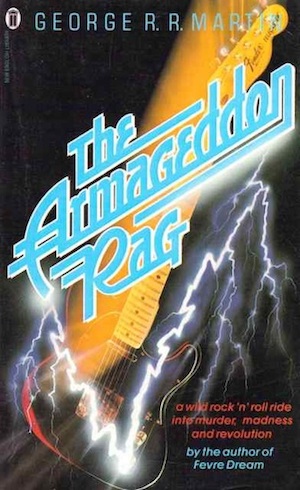
Former hippie novelist Sandy Blair has watched with increasing displeasure as bean counters reduce once-beloved icons to crassly commercial products. The sole alternative to assimilation by inexorable capitalism is death; Nazgûl lead singer Patrick Henry “Hobbit” Hobbins, for example, never gave into commercialism’s temptations because he was too murdered to even be tempted.
Rock promoter Jamie Lynch’s brutal murder appears to offer a chance to reverse the tide. Without Lynch as an impediment, the remaining members of Nazgûl are convinced by a shadowy impresario to join a reunion tour. A young look-alike is found to fill in for Hobbit Hobbins, and Blair is convinced to become the band’s press agent. Blair’s angry nostalgia makes him the perfect tool in a supernatural conspiracy determined to punish the world for abandoning Flower Child idealism.
* * *
Record of a Spaceborn Few by Becky Chambers (2018)
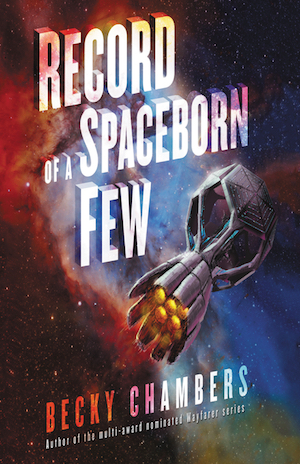
Fleeing a ruined Earth, the Exodus Fleet survived centuries of interstellar wandering because the inhabitants embraced recycling, strict environmental rules, and sharing rather individual greed. Their journey ends when they encounter the Galactic Commons, a consortium of worlds whose advanced technology recasts the Fleet as a primitive oddity and galactic charity case.
This revelation puts the Fleet in an awkward spot. How can it convince young people not to emigrate in search of the wealth and opportunities the Commons offers? Unless the aging Fleet can somehow persuade its children that its austere, communal way of life is worth preserving, then the only future it has is slow decline and abrupt collapse.
That is, unless folks from the Commons are willing to join the Fleet …
The books previously mentioned were published in the ‘60s, ‘70s, and ‘80s. This book, however, is contemporary. The dream survives.
* * *
No doubt those of you who are not now hitting search engines to determine what exactly a “hippie” or a “counterculture” might be have your own favourites I did not mention. Comments are below. Can you dig it?
In the words of Wikipedia editor TexasAndroid, prolific book reviewer and perennial Darwin Award nominee James Davis Nicoll is of “questionable notability.” His work has appeared in Publishers Weekly and Romantic Times as well as on his own websites, James Nicoll Reviews and Young People Read Old SFF(where he is assisted by editor Karen Lofstrom and web person Adrienne L. Travis). He is a four-time finalist for the Best Fan Writer Hugo Award and is surprisingly flammable.










